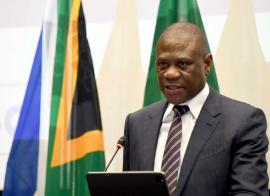
Deputy President Paul Mashatile has called on the faith-based community to partner with government to make tangible contributions towards addressing the social ills facing the country.
Mashatile convened an engagement between government and inter-faith leaders on Tuesday to strengthen existing partnerships towards the country’s social cohesion and nation-building project.
“Not a day goes by that we are not confronted by acts of violence and criminality. This is not the South Africa we fought for. It is certainly not the South Africa we want ourselves and future generations to live in,” he said.
The country’s second-in-command raised his concern at the deterioration of the social and moral fabric, including gender-based violence and femicide, poverty, unemployment, drug and substance abuse, child abuse, crime, corruption, teenage pregnancy, and the high rate of HIV infection among young people.
“It is disheartening that the women and girls of our country no longer feel safe in their homes, on the streets, in public transport and at their places of work.
“Many of our people are abusing alcohol and using drugs, which is causing numerous social problems such as unsafe behaviour on our roads, violence, crime, and truancy.”
The Deputy President also raised concerns about youngsters who are still engaging in unsafe sex, leading to high rates of teenage pregnancy and the spread of sexually transmitted diseases.
To address these difficulties, he believes a collaborative effort must be employed involving governmental entities and all segments of society, of which inter-faith communities are an essential component.
“Inter-faith efforts, like community service, can be used to effect societal change. Now, more than ever, we must join forces to counter what has grown to threaten our communities.”
The Deputy President reiterated that the State is committed to addressing social ills and improving lives.
He also took the time to talk about how South Africa transitioned from an oppressive State machinery to a democratic nation, where all people enjoy equal rights and protection before the law.
“Today, our churches, our mosques, our synagogues and our temples are pillars of society doing valuable work in education, in feeding the poor and the needy, and in being a consistent and powerful voice that speaks out against injustices in our country.”
He expressed his appreciation for the role of faith-based communities in guiding the nation when it strayed from its mission to unite and develop the country.
“It is the excellent work you are already doing in our communities that we want to harness and build upon. Whether it is in providing education and awareness around alcohol and substance abuse, in offering counselling and support to couples and families, or in mobilising people around anti-crime initiatives, you have been our valued partners as we seek to address these social problems.”
He called on leaders to safeguard the significance of religious and sacred sites, as these sites hold immense cultural value, and are crucial to ensuring traditions are not eroded over time.
“As we all know, our nation thrives in its cultural richness and religious diversity.”
Despite the many challenges, he is of the view that South Africa can emerge strong if it embraces its diversity.
He also lauded the role played during apartheid by faith leaders like Beyers Naudé, Desmond Tutu, Peter Storey, Allan Boesak and Dr Martin Luther King Jnr.
“Reflecting on this history and also acknowledging the temporal disparities and distinct challenges of our current era, we must draw from the lessons of the past, and use them as a compass for addressing some of the social challenges that exist in our modern culture.” – SAnews.gov.za


